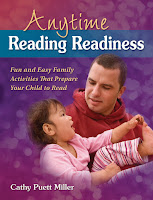First, always remember that the interaction you offer your child with letters of the alphabet should be meaningful and not just isolated memory tasks. Make it fun and playful, not a structured lesson or drill. Begin with uppercase letters, as they are easier for children to recognize. Most print occurs in both upper and lower case so you may choose to teach both, according to the abilities of your child. Let your child help you see which is best for them.
• Go on a letter hunt! Watch your child as he interacts with his world and everything in it. Letters are everywhere! Does he notice certain signs and logos, such as "exit" signs, store or restaurant logos? When he does, point out and name letters with him. Start with the first letter of a word. Pick a letter of the alphabet and look for it everywhere it might be. You can hunt in the house, while driving in the car (street and store signs), down the hall at the preschool or the store, letters are everywhere!
• The importance of our name. Help your child learn to recognize her own name and the letters that spell it. Begin by showing your child her whole name in print. Maybe you print her name on a sign for her door or the refrigerator. You can also put name labels on her backpack, lunchbox, or on a nameplate or inside the covers of her favorite books. Don't just label everything for the sake of letters; it will make them "visual white noise" rather than showing print as meaningful. Show your daughter her name on mail like doctor appointment reminders, calendars, or junk mail.
To help your child learn the letters in her name, write it slowly, saying each letter aloud as you print. Then encourage her to copy the letters. The best way to help your child learn how to write at this age is to involve her in activities that help her feel large motions of writing. Squiggles are OK.
• Playing with Magnetics Once your child has a small bank of letters he can easily recognize (maybe letters from his name and those he sees in his world), play with magnetic letters on the refrigerator or even simple blocks. Arrange them to say the names of other family members or spell simple words or words your child is interested in. Pick up on words your child is using (milk, hand, toes, etc.). You can even make your own "play" letters out of cardboard (old cereal boxes are easy to use for this - the reverse/inside with no print).
 Whenever you and your child are playing and learning, encourage and be positive, know that learning letters or many other things takes time and that your child should improve over time. If you don't see improvement as you think should happen, talk it over with your child's preschool teacher or someone who has studied early childhood development (even your pediatrician). They can help you understand what is normal for your child.
Whenever you and your child are playing and learning, encourage and be positive, know that learning letters or many other things takes time and that your child should improve over time. If you don't see improvement as you think should happen, talk it over with your child's preschool teacher or someone who has studied early childhood development (even your pediatrician). They can help you understand what is normal for your child.




